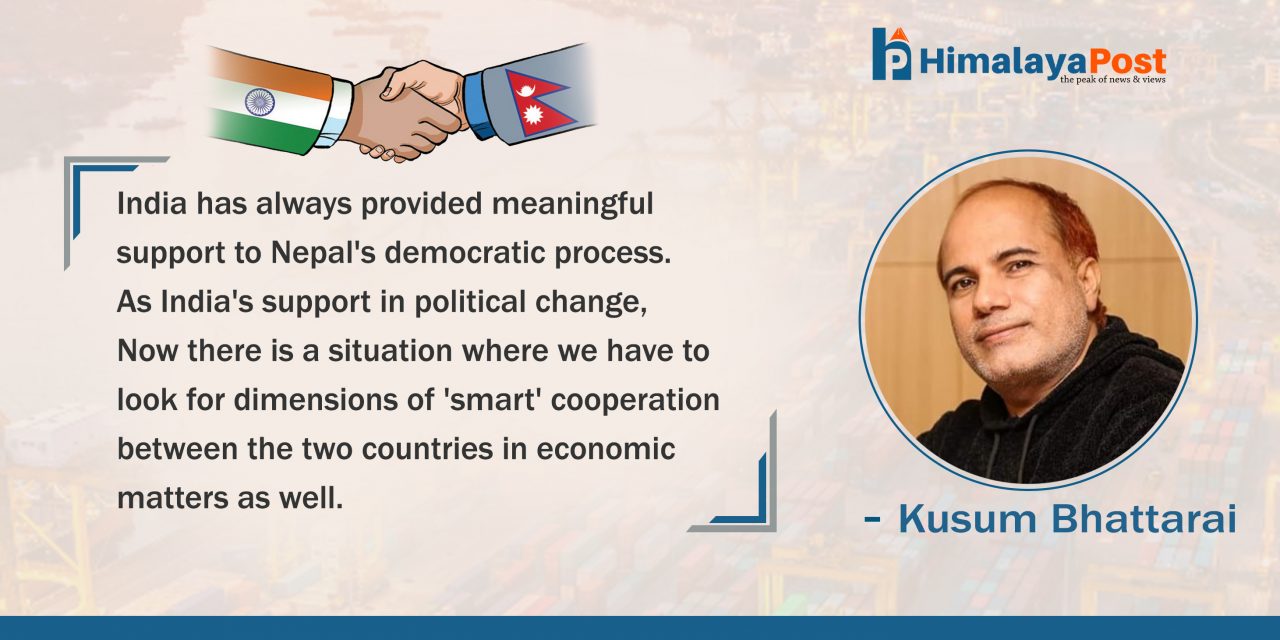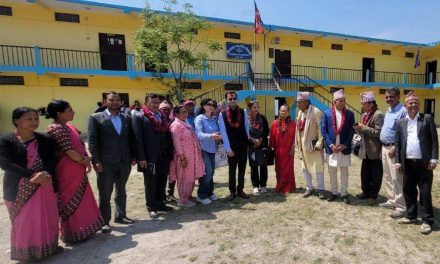– Kusum Bhattarai
Kathmandu- Not only are geopolitical and geostrategic relations of the world important, but the neighboring countries of Nepal and India, for centuries, which have been tied together by religious, cultural, linguistic, social, and political connections, have their own important amid the unrest that has arisen in South Asia for some time.
Nepal has always had a unique relationship with India, unlike Sri Lanka, Pakistan, Bangladesh, and the Maldives. Balancing the two superpowers of the North and the South is being done diplomatically. The world market experiences ups and downs due to open borders, unrestricted movement, daily chatter about import-export, and the same desire for economic development, there is a great possibility that Nepal and India can have a close partnership in the future in favor of their respective national interests.
Nepal and India in South Asia have established themselves as countries where people have risen to a high level of consciousness. Both countries’ new generation has evolved into a smart generation’. Why couldn’t the economic prosperity and development of Western countries in the past two hundred years have happened in Nepal or India? The current generation is pondering how to bring their country to the level of a developed country. In such a ‘smart’ era, it is inevitable that the relationship between Nepal and India should also be ‘smart’.
Democracy is still practiced in Nepal. It’s not about whether it’s the People’s Movement of 2046 or the second People’s Movement of 2062, it is not a secret that Indian political parties exist, and moral support and cooperation towards the restoration of democracy in Nepal has been provided by intellectuals and even established parties.
India holds the title of the largest democracy in the world. India has always provided meaningful support to Nepal’s democratic process. As India’s support in political change, Now there is a situation where we have to look for dimensions of ‘smart’ cooperation between the two countries in economic matters as well.
‘Smart’ financial Connections
Nepal and India should collaborate with a new vision rather than following the traditional pattern. After the rise of Prime Minister Narendra Modi in India, India’s perception of Nepal has changed significantly. The Indian founding party has concluded that the prosperity of Nepal is also beneficial to India.
If there is an increase in poverty, destitution, and unrest in Nepal, terrorist activities and civil war could happen, which would also have a negative impact on India, so peace, stability, and prosperity in Nepal have become a matter of concern for both Nepal and India.
Nepal has abundant natural resources, they are being wasted if they are not utilized properly. Thanks, America is helping for the construction of power transmission line through ‘MCC’. A new wave of hydropower generation is being created in Nepal through the government and private sector. The goal is to produce 10,000 megawatts of electricity. Nepal is now more likely to sell electricity produced in this way from India to Bangladesh.
In contemporary, as there is a meaningful cooperation between Nepal and India in the purchase and exchange of electricity, India will also be the main buyer of the electricity we produce in the future. If the water resources are properly utilized, economic development of Nepal can be achieved through smart partnership’ with India.
The expansion of transport infrastructure seems to be beneficial for both Nepal and India. The economic movement between the two countries will be sped up by the ‘fast track’, which is currently in full swing. Nepal can increase its exports by increasing its domestic production, even though it is currently dependent on imports. India has already proposed creating a comprehensive project report for the Raxaul-Kathmandu rail line. The Raxaul-Kathmandu railway could be another milestone in economic development for both India and Nepal.
We are envisioning a train arrival exclusively from the north without taking into account the high altitude, geographical difficulty, and convenience, instead of getting confused by gossips that make the saying ‘squeezing water from a stone’ and certain leaders seem to be very north-oriented, we need to work towards achieving the dream of the Raxaul-Kathmandu railway, which is both achievable and beneficial.
To make Nepal’s economic relationship with India smart, it is enough to pay attention to one thing: reducing Nepal’s trade deficit with India. Nepal is a recipient of goods worth 15 billion dollars from India every year. Nepal doesn’t export more than one billion dollars to India every year. Both countries need to think differently to bridge this trade deficit gap.
Whatever goods India imports from other countries, it can create an environment for its production in Nepal. There are many such goods for Nepal’s internal consumption, which can be produced in Nepal. There is no need to bring those things from India. However, while the people of Chitwan are pouring cauliflower and onions on the road, truckloads of cauliflower and onions are entering Nepal from nearby Raxaul.
A process that benefits both Nepal and India can make the relationship smarter by making the production, price, distribution, and sales chain fair. If the government buys the products produced by Nepali farmers directly and distributes them to the general public at a concessional rate through the government mechanism, the erosion of ‘surplus value’ or the spread of middlemen can be eliminated. Nepali farmers are fleeing because their products are not being valued properly, and we must depend on foreign countries even for poor-quality goods. India needs to demonstrate generosity in solving this problem of Nepal.
It should be noted that Nepal is the eighth country in the world that sends a significant amount of remittances to India. The Indian Gorkhali Army and Nepalis who work in India are sending 1 billion dollars to Nepal every year, but the Indians who work in Nepal are sending 3 billion dollars every year.
India accounts for 65 percent of Nepal’s total trade. India holds 45% of Nepal’s $10 billion foreign exchange reserve, with 25% invested in Indian bonds and 20% in banks. This has resulted in India receiving a financial benefit of $4.5 and a half billion dollars. Nonetheless, we acquire petrol worth 2 billion dollars from India every year.
India receives a significant portion of Nepal’s one trillion rupees per year spent on foreign visits. Students who go to study abroad spend more than 38 billion dollars every year, most of which goes to India. Thus, Nepal’s direct contribution to India’s economy is seen. Grateful for this contribution, it will not matter if India also remembers Nepal well.
Partnership Along cooperation
Since 1951, India has been assisting Nepal in various projects. India’s support has been in infrastructure, health, transport, education and communication. 8 districts of Terai have been receiving support from the Consulate General of India in Birgunj.
Whether it is during the corona disaster, or when there is an earthquake. It is important to note that India offered relief and assistance to Nepal as soon as possible. There is no account of India’s grant aid in Nepal. India’s cooperation persists in all areas. However, in addition to this series of cooperation, Nepal and India should now collaborate on new projects that can benefit both countries.
For example, every year in Nepal there is a waste of manure. There are numerous challenges that must be overcome when importing fertilizer from Bangladesh. In such a situation, India can help in setting up a large fertilizer factory in Nepal. Such a factory, from which the manure produced not only in Nepal, but also in India’s Uttar Pradesh and Bihar’s farm barns will become fertile. Moreover, we can export the leftover fertilizer to other countries. In many such ‘plants’ there can be partnership and cooperation between Nepal and India.
Insofar as boundary issues arise from time to time to put a strain on the relationship, this can also be resolved through dialogue. The ongoing process of resolving the border problem through the meeting of the Nepal-India Boundary Working Group needs to continue.
In accordance with international law, Nepal has not received access to the sea, trade, and transportation facilities that the United Nations is supposed to provide to landlocked countries. India should now be more liberal in this. Of course, the columnist agrees with one of the words of the Indian Prime Minister, which he said when he became the Prime Minister for the first time – “I want to have eye-to-eye relations with the neighboring countries, not by eye-to-eye.”
Apart from Pakistan, Indian Prime Minister Modi’s relationship with neighboring countries has created a new wave of development in South Asia. Bangladesh is also experiencing a surge in the development of physical infrastructure and economic progress. The per capita income of Bangladeshis has risen above that of Indians. However, due to the instigation of Muslim extremists and some power centers, the public opinion of Bangladesh is now agitated, panicked, chaotic and confused. To restore the democratic system in Bangladesh, it is necessary to alleviate the situation.
The situation in Nepal differs from Bangladesh. Despite the government’s changes, it is being done through a legal process. In a democracy, the majority will determine who governs. After Dahal, now KP Oli is the Prime Minister, tomorrow Sher Bahadur Deuba will be. However, every process is done according to law, this is the beauty of democracy.
Hence, there is not much political confusion or difficulty in the economic prosperity of Nepal at this time. The inevitable amendment of certain unnecessary aspects in the constitution was inevitable, and it should have been. Now the main focus of Nepal is economic prosperity and the indispensable aspect for economic prosperity is the smart business, financial and investment partnership and cooperation with India according to the new era.
To enhance the economic dimension of the relationship between Nepal and India, foreign secretary-level talks must be meaningful.





